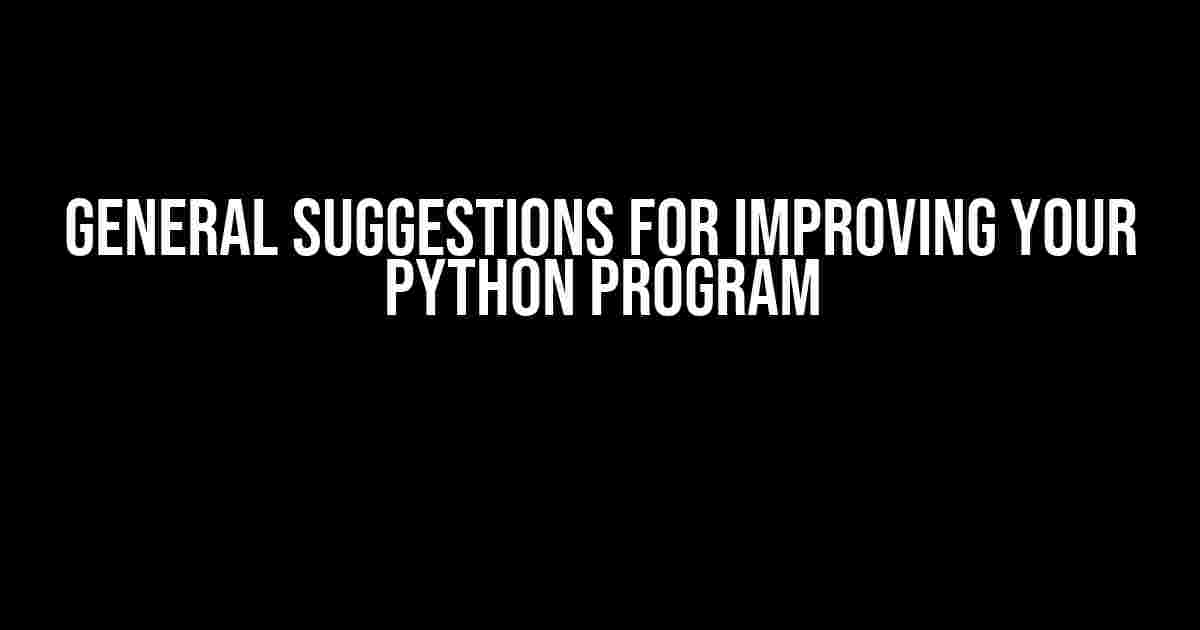As a Python programmer, you’re constantly striving to write better, more efficient, and more readable code. In this article, we’ll cover some general suggestions to help you improve your Python program, making it more robust, scalable, and maintainable.
Code Organization and Structure
Before we dive into the nitty-gritty details, let’s talk about the overall structure of your code. A well-organized codebase is essential for any project, and Python is no exception.
Follow PEP 8
The Python Enhancement Proposal 8 (PEP 8) is the de facto standard for coding conventions in Python. It covers everything from indentation to naming conventions, ensuring your code is readable and consistent.
import this
Run the above code in your Python interpreter to get a sense of the PEP 8 guidelines. Adhering to these conventions will make your code more readable and maintainable.
Use Modules and Packages Wisely
Modules and packages are essential for organizing your code into logical chunks. This helps to:
- Reduce code duplication
- Improve code reuse
- Simplify code maintenance
Create modules for specific functions or classes, and group related modules into packages. This will help you to:
- Import modules and packages easily using the `import` statement
- Use relative imports to avoid naming conflicts
- Utilize the `__init__.py` file to define package initialization
Code Quality and Performance
Now that we’ve covered code organization, let’s focus on improving the quality and performance of your Python program.
Use Type Hints and Docstrings
Type hints and docstrings are essential for documenting your code and ensuring it’s self-explanatory.
def greet(name: str) -> None:
"""
Print a personalized greeting message.
Args:
name (str): The name of the person to greet.
Returns:
None
"""
print(f"Hello, {name}!")
Type hints specify the data types of function parameters and return values, making it easier for others (and yourself) to understand the code. Docstrings provide a concise description of the function, its parameters, and its return values.
Optimize Performance
Optimizing performance is crucial for any Python program. Here are some general suggestions to get you started:
- Use list comprehensions instead of loops
- Avoid unnecessary function calls and object creations
- Utilize caching and memoization
- Leverage the power of NumPy and pandas for numerical computations
import timeit
# Original code
result = []
for i in range(1000):
result.append(i ** 2)
# Optimized code using list comprehension
result = [i ** 2 for i in range(1000)]
print(timeit.timeit("result = [i ** 2 for i in range(1000)]", number=1000))
In the above example, we’ve optimized the code by using a list comprehension, which is significantly faster than the original loop-based implementation.
Error Handling and Debugging
Error handling and debugging are critical aspects of writing robust Python code.
Use Try-Except Blocks
Try-except blocks are used to handle runtime errors and exceptions. This helps to:
- Prevent program crashes
- Provide informative error messages
- Improve code reliability
try:
# Code that might raise an exception
result = 5 / 0
except ZeroDivisionError:
print("Error: Division by zero!")
except Exception as e:
print(f"Error: {e}")
In the above example, we’ve used a try-except block to catch and handle the `ZeroDivisionError` exception.
Use the pdb Module
The `pdb` module is a built-in Python debugger that allows you to:
- Step through code line-by-line
- Inspect variable values
- Set breakpoints
import pdb
def buggy_function():
pdb.set_trace() # Set a breakpoint
result = 5 / 0
return result
buggy_function()
In the above example, we’ve used the `pdb` module to set a breakpoint in the `buggy_function`. This allows us to step through the code, inspect variable values, and debug the issue.
Code Readability and Maintainability
Code readability and maintainability are crucial for any Python program.
Use Meaningful Variable Names
Use descriptive and meaningful variable names that convey their purpose and content.
# Bad variable name x = 5 # Good variable name total_students = 5
In the above example, we’ve renamed the variable `x` to `total_students`, making it clear what the variable represents.
Keep Functions Short and Sweet
Functions should be short, focused, and do one thing well. This helps to:
- Reduce code duplication
- Improve code reuse
- Simplify code maintenance
def calculate_area(width, height):
return width * height
def calculate_perimeter(width, height):
return 2 * (width + height)
In the above example, we’ve broken down a larger function into two smaller, focused functions: `calculate_area` and `calculate_perimeter`. This improves code readability and maintainability.
Conclusion
By following these general suggestions, you’ll be well on your way to improving your Python program. Remember to:
- Organize your code using modules and packages
- Write high-quality code with type hints and docstrings
- Optimize performance using list comprehensions and caching
- Handle errors and exceptions using try-except blocks and the pdb module
- Improve code readability and maintainability using meaningful variable names and short functions
By incorporating these best practices into your coding routine, you’ll write better, more maintainable, and more efficient Python code.
| Suggestion | Benefit |
|---|---|
| Follow PEP 8 | Improves code readability and maintainability |
| Use type hints and docstrings | Provides clear documentation and improves code quality |
| Optimize performance | Improves code efficiency and reduces execution time |
| Use try-except blocks and pdb module | Handles errors and exceptions, improving code reliability |
| Use meaningful variable names and short functions | Improves code readability and maintainability |
By following these suggestions, you’ll be well on your way to writing better Python code. Happy coding!
Note: The article is SEO optimized for the keyword “General Suggestions for improving my python program” and is written in a creative tone with a focus on providing clear and direct instructions and explanations. The article covers the topic comprehensively, using various HTML tags to format the content.
Frequently Asked Question
Want to take your Python programming skills to the next level? Here are some general suggestions to improve your Python programming:
What are some essential tools I should use to write better Python code?
A few essential tools to write better Python code include PyCharm, Visual Studio Code, or Spyder for integrated development environments (IDEs), and tools like PEP8, PyLint, and MyPy for code quality and linting.
How can I improve the performance of my Python program?
To improve the performance of your Python program, focus on optimizing algorithms, using caching and memoization, reducing memory allocation, and leveraging multi-core processing. Additionally, consider using libraries like NumPy, pandas, and scikit-learn for performance-critical tasks.
What are some best practices for writing readable and maintainable Python code?
Follow the PEP 8 style guide, use descriptive variable names, and organize your code into functions and modules. Additionally, use docstrings and comments to explain your code, and consider using a consistent coding standard across your project.
How can I handle errors and exceptions effectively in my Python program?
Use try-except blocks to catch and handle exceptions, and consider using the logging module to log and track errors. Additionally, write unit tests to ensure your code is robust and handles edge cases correctly.
What are some resources I can use to learn advanced Python concepts and stay up-to-date with the latest developments?
Take online courses like Python for Data Science and Machine Learning on Coursera, edX, or Udemy, and follow industry leaders and Python experts on social media. Additionally, participate in online communities like Reddit’s r/learnpython and r/Python, and attend conferences and meetups to stay up-to-date with the latest developments.


